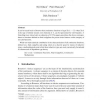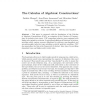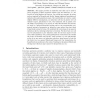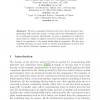MSCS
2008
13 years 4 months ago
2008
Subtyping for inductive types in dependent type theories is studied in the framework of coercive subtyping. General structural subtyping rules for parameterised inductive types ar...
ENTCS
2006
13 years 4 months ago
2006
It can be traced back to Brouwer that continuous functions of type StrA B, where StrA is the type of infinite streams over elements of A, can be represented by well founded, Abra...
CORR
2006
Springer
13 years 4 months ago
2006
Springer
: This paper is concerned with the foundations of the Calculus of Algebraic Constructions (CAC), an extension of the Calculus of Constructions by inductive data types. CAC generali...
CSL
2010
Springer
13 years 5 months ago
2010
Springer
This paper provides an induction rule that can be used to prove properties of data structures whose types are inductive, i.e., are carriers of initial algebras of functors. Our res...
ICALP
2004
Springer
13 years 10 months ago
2004
Springer
We show that strictly positive inductive types, constructed from polynomial functors, constant exponentiation and arbitrarily nested inductive types exist in any Martin-L¨of categ...
APLAS
2004
ACM
13 years 10 months ago
2004
ACM
Abstract. We give a semantic footing to the fold/build syntax of programming with inductive types, covering shortcut deforestation, based on a universal property. Specifically, we...
LICS
2009
IEEE
13 years 11 months ago
2009
IEEE
The search for an expressive calculus of datatypes in which canonical algorithms can be easily written and proven correct has proved to be an enduring challenge to the theoretical ...




